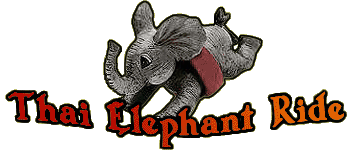 |
 |
 |
|
|||
|
Thai Elephant Ride
In the noise and congestion of Bangkok's cheesy Patpong night market, a brightly painted baby elephant accepts bananas from passing strangers. The elephant's human companion charges a few baht for the privilege of feeding the creature. Meantime, vendors hawk hundreds of items with images of elephants. Elephants on shiny postcards, embroidered purses, even crudely carved elephants hanging off cheap earrings. I slip on a three dollar brass bracelet hammered with two lovely little beasts raised trunks entwined, decorative, symbolic, my talisman. In the heart of this commercial clutter it is almost impossible to fathom that anyone of these honking taxi drivers, or fast walking bankers, garment workers, teenagers, have a deep connection with elephants. I'm wrong. 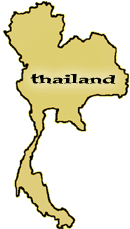
Mr Tan: "They are smart, they can show the people how clever they are and how gently the people who own elephants have such a good relationship with elephants so that means they got to stay with them until they die." Mr. Tan is in the tourism industry. He is every bit a 21st century city guy, but he's got elephants on his mind and he is worried about their future. From ancient times to the present, the elephant has symbolically and practically been important to Thais. It's told that the Buddhist relics were carried up a mountain on a white elephant and there, at the top, a temple was built in Buddha's honor. Early Thai royalty led troops into battle riding war elephants and for decades elephants worked in the northern jungle, rolling and dragging, lifting tons of teakwood from dense forests. Now logging is illegal, and elephants are unemployed. Here, just 400 miles north of Bangkok, a few thousand elephants, loose skinned and dusty, still sway heavily through the forest, but most elephants, like retired athletes down on their luck, are left with few options for dignified work. It's a job in a cheap show or die. For tourists like us, the desire to see elephants but not contribute to their misery leads us to what we hope will be one of the more humane shows like this one at the Thai Elephant Conservation Center in Lampang. 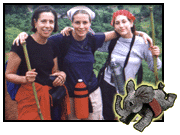
They bathe and we think they speak to us. We feed the elephants, their trunks are pink and soft and gentle. Now we're impatient to find a guide. We want to travel in the jungle on the back of the beast with a mahout. In my dream of this hike to find elephants, it's hot and sunny and I'll snap photo after photo of the kids by crystal streams and against remote magnificent tropical backdrops.
Child: "I'm really hungry and tired. Oh mommy, please. Are we there yet?" In fact it's raining, pouring, the footpath beneath us is steep, slick and rutted with the texture and color of a giant exposed brain. We have hiked for three hours when we finally reach the first village. We hear the women even before they appear out of the jungle into the clearing clanging with silver headresses. They're wearing what looks like dresses from ethnic shops in Berkeley or Cambridge, only this is real. Followed, or rather herded by a group of about 20 women, we move deeper into the village. The rain has stopped, but the village is almost deserted except for a wiry old man sitting on the ground in front of a hut. This is Gao, the chief of all that lies before him. Twenty years ago he lived with, rode, commanded elephants and the mahouts of his tribe. Today, he lazily twists straw, weaving a basket for corn. Still, no elephants. Back in the jungle, the kids are too wet and tired to appreciate the solitude, the slick green of huge leaves, the mist on the hills. Too busy looking at the ground trying not step on one of 300 types of snakes. 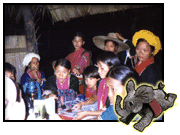
Judith: "What animal droppings is that right there on the ground?" We're soaked. It's getting dark and my talisman, the thin brass bracelet with a small image of elephants on it is turning my wrist green. We're sinking into the mud and it is becoming difficult to lift our feet. When at last we stumble into a small village, we're invited to eat, to stay the night, but most importantly, assured an elephant will indeed come for us. And there, by kerosene light in the buggy night, the adults talk of the old days: mahouts, elephants. The children sing elephant songs. Night comes and dogs howl and the drummers drum and still no elephants. We wake and before the sleep is rubbed from our eyes.
Child: "Mom. There's an elephant coming! Yeah! There's a huge elephant coming. Oh my gosh that's huge! How do we get up?" 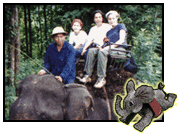
A three-and-a-half ton Indian Elephant is standing at the top of the hill waiting for us.
Mahout: "This way please. Go on the step there. Go up step and step on the backside of the elephant." The Mahout, a dignified Keren tribesman in a straw safari hat, faded dress pants and no shoes, is balanced 12 feet up on the elephants neck, casually hand rolling a cigarette. 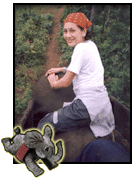
Now we are behind the giant wrinkled pink and gray mottled ears. The huge head has a sweet covering of little hairs sticking up like the infrequent shoots of a newly seeded lawn. The earth has just rolled on its axis under us, or so it seems, as the elephant starts walking and the waving villagers and dogs are tiny figured and we are eye level with coconuts, mangos and butterflies. The Mahout is grunting and poking our elephant, who stops to rip a small bamboo tree out of the ground. Nice, except that to do so he is tossing his head in a bucking motion. I think I will be hurled to the ground. This makeshift straw saddle is slipping. I am terrified and have forgotten to relish the moment of intimacy with this amazing beast. We're in the mud miles from anywhere, anyone. The kids are happy and climbing all over the elephants head and neck and talking to it as though it is our pet dog. I feel the kid's joy. I hear our elephant breathing and roll with it as it pulls and yanks another tree from the earth, crunching the young bamboo. And then I remember Mr. Tan's words weeks ago when we arrived in noisy Bangkok: how clever, how gently are the elephants. For the Savvy Traveler, I'm Judith Ritter |
 | American Public Media Home | Search | How to Listen ©2004 American Public Media | Terms of Use | Privacy Policy |
